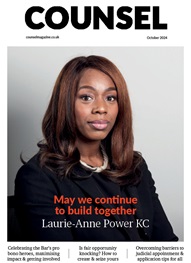*/
THE Bar Council has responded to the findings of a report which shows that poor case management by the CPS is having a direct impact on court proceedings.
The report, by Her Majesty’s Crown Prosecution Inspectorate, indicates a range of problems, including the non-recording of a defendant's bail status in 36% of magistrates' and Crown Court cases, and the non-recording of follow-up action in 16% of magistrates' courts files and 35% of Crown Court files. The auditors concluded that the CPS was managing the majority of its case files in an 'unsatisfactory manner'. Sally O'Neill QC, Chairman of the Criminal Bar Association commented on the report, stating:
'The knock-on effect of poor case management is felt in court. If a file is not properly managed and the orders of the court not properly recorded, the preparation of the case can go wrong. The advocate lacks proper instructions for the hearing and delays occur as attempts are made to put the case in order. The Bar Council and the CBA are seeking to work with the CPS to encourage the CPS staff to improve all aspects of case management so that cases are presented to the Court in a well-prepared state.’
Tim Dutton QC, Chairman, Bar Council, expressed concern over the findings of the report, saying that effective casehandling by the CPS was critical to good case preparation: 'The Bar Council wants to support the professional development of barristers working within the CPS, and to do so in partnership with the referral Bar.
It is important that the CPS should manage cases effectively and efficiently making use of the organisation to focus on the preparation of cases and the management of files ensuring that everything is in order before the case comes into court .
To this end, the Government should also make undertaking prosecution work open to the best advocates by keeping to a commitment to providing equality of arms in trials’.
The report, by Her Majesty’s Crown Prosecution Inspectorate, indicates a range of problems, including the non-recording of a defendant's bail status in 36% of magistrates' and Crown Court cases, and the non-recording of follow-up action in 16% of magistrates' courts files and 35% of Crown Court files. The auditors concluded that the CPS was managing the majority of its case files in an 'unsatisfactory manner'. Sally O'Neill QC, Chairman of the Criminal Bar Association commented on the report, stating:
'The knock-on effect of poor case management is felt in court. If a file is not properly managed and the orders of the court not properly recorded, the preparation of the case can go wrong. The advocate lacks proper instructions for the hearing and delays occur as attempts are made to put the case in order. The Bar Council and the CBA are seeking to work with the CPS to encourage the CPS staff to improve all aspects of case management so that cases are presented to the Court in a well-prepared state.’
Tim Dutton QC, Chairman, Bar Council, expressed concern over the findings of the report, saying that effective casehandling by the CPS was critical to good case preparation: 'The Bar Council wants to support the professional development of barristers working within the CPS, and to do so in partnership with the referral Bar.
It is important that the CPS should manage cases effectively and efficiently making use of the organisation to focus on the preparation of cases and the management of files ensuring that everything is in order before the case comes into court .
To this end, the Government should also make undertaking prosecution work open to the best advocates by keeping to a commitment to providing equality of arms in trials’.
THE Bar Council has responded to the findings of a report which shows that poor case management by the CPS is having a direct impact on court proceedings.


Our call for sufficient resources for the justice system and for the Bar to scrutinise the BSB’s latest consultation
Marie Law, Head of Toxicology at AlphaBiolabs, discusses alcohol testing for the Family Court
Louise Crush of Westgate Wealth explains how to make sure you are investing suitably, and in your long-term interests
In conversation with Matthew Bland, Lincoln’s Inn Library
Millicent Wild of 5 Essex Chambers describes her pupillage experience
Louise Crush of Westgate Wealth explores some key steps to take when starting out as a barrister in order to secure your financial future
From a traumatic formative education to exceptional criminal silk – Laurie-Anne Power KC talks about her path to the Bar, pursuit of equality and speaking out against discrimination (not just during Black History Month)
James Onalaja concludes his two-part opinion series
Expectations, experiences and survival tips – some of the things I wished I had known (or applied) when I was starting pupillage. By Chelsea Brooke-Ward
If you are in/about to start pupillage, you will soon be facing the pupillage stage assessment in professional ethics. Jane Hutton and Patrick Ryan outline exam format and tactics
In a two-part opinion series, James Onalaja considers the International Criminal Court Prosecutor’s requests for arrest warrants in the controversial Israel-Palestine situation